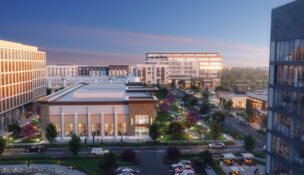Loudoun County advances changes to data center regulations
County has 117 planned data centers, in addition to 199 built
Josh Janney //February 13, 2025//

Loudoun County's Board of Supervisors approved major changes to how data centers are regulated. Photo: AdobeStock

Loudoun County's Board of Supervisors approved major changes to how data centers are regulated. Photo: AdobeStock
Loudoun County advances changes to data center regulations
County has 117 planned data centers, in addition to 199 built
Josh Janney //February 13, 2025//
Loudoun County has 117 data centers in the pipeline, but its Board of Supervisors is considering substantial changes to how the county regulates the booming industry due to growing concerns from residents.
A board vote this week moved the issue forward, with a second vote expected in March to deal with expectations for pending data centers.
Citing a September 2024 report from Kimley-Horn, Vice Chair Michael Turner said there are 199 data centers on the ground in Loudoun County and 117 in the pipeline. Of these, 84 have site plans submitted.
But Turner noted that county officials and citizens have become concerned about the abundance of data centers popping up, noticing they were starting to be built in “inappropriate places,” i.e., right next to residential neighborhoods. This rapid growth prompted county officials to assess “where data centers are, where they could be, and where we don’t want them.”
According to a presentation from County Administrator Tim Hemstreet, the data center industry now generates 38% of all the county’s general fund revenues. But despite the financial upsides, opponents often complain about the data centers straining the state’s electric grid, the centers generating too much noise and the buildings being eyesores.
Additional oversight
On Wednesday night, the board voted 6-2 to advance changes to the county’s comprehensive plan and zoning ordinance. The comprehensive plan amendment makes data centers a “conditional use” in places where they are currently a core or complementary use. This change requires all future data centers to meet certain conditions to be built.
The zoning ordinance amendment designates data centers as a “special exception” use in county areas where they are currently permitted by-right. Turner explained that by-right applications could be approved administratively, whereas “special exception” requires applicants to go through a public hearing process and get approval for data centers from the board. The board plans to take a final vote on these proposed amendments during its March 18 meeting.
The board’s vote was preceded by an 80-minute public hearing, where several mayors and residents urged the supervisors to approve the amendments, saying they allowed for data centers to be evaluated on a case-by-case basis and ensured the supervisors could mitigate the impacts of the centers. Many opposed adding provisions to grandfather in potential data centers with pending applications.
“If these new regulations are so necessary to prevent future harm, then we should apply them universally today, without loophole grandfathering provisions,” said Middleburg Mayor Trowbridge “Bridge” Littleton.
Members of the business community and other supporters argued that data centers support the local economy and provide high-paying jobs. Several advocated for a grandfathering clause to be added to accommodate existing investments. According to Planning Director Daniel Galindo, there are 36 active by-right applications as of Dec. 1, 2024.
Ultimately, most of the supervisors decided to advance the matter to the March 18 meeting, with supervisors Caleb Kershner and Kristen C. Umstattd being the dissenting votes. Supervisor Matthew Letourneau was absent. Umstattd worried that the new regulations could harm Loudoun’s reputation as a place where people can do business.
“I have been increasingly uncomfortable with the fact that we are singling out one industry and targeting that industry to put limits on it in a way that we don’t do with any other industry, or even with residential development,” she said.
Supervisor Koran T. Saines accused some of his colleagues of “fear-mongering” with the insinuation that data centers might avoid the county over the proposed zoning changes. Supervisor Laura TeKrony said by-right developments don’t give oversight and the voice the public asks for.
“A special exception ensures transparency and provides an opportunity for the community to voice support or concerns,” TeKrony said.
Before the March 18 meeting, county staff will present the supervisors with various options that would grandfather data centers with pending applications. Galindo said if the board decides to pass a resolution grandfathering some data centers, the vote on that resolution would also occur on March 18.
Turner told Virginia Business that the county’s changes to data center regulations will occur in two phases, with the first phase concluding with the vote that will take place in March.
“Phase two is we’re going to implement comprehensive performance standards on all data centers going forward, things like setbacks, power usage, noise levels, emissions controls and emission standards,” he said.
Energy concerns
A Dec. 9 report from the Joint Legislative Audit and Review Commission acknowledged the challenges in the state being able to provide the necessary infrastructure to keep up with the demands of data centers. The report found that a substantial amount of new power generation and transmission infrastructure will be needed to meet unconstrained energy demand or even half of unconstrained demand. The Virginia General Assembly last year forwarded all data center-related bills to this year’s session so lawmakers could take JLARC’s study into consideration.
Turner foresees the challenges of the data centers and power resulting in one of three scenarios.
“The first is the utilities will cap the power available to the data centers just to protect the grid,” Turner said. “They won’t call it that, but they will.”
The second option, he said, is that the industry, on its own, will organically develop ways to process data with far less energy.
“And the third thing is the industry will get tired of being held hostage by the limitations of the grid, and they will develop their own on-site power with microgrids, so they have their own on-site power source,” he said.
F
















